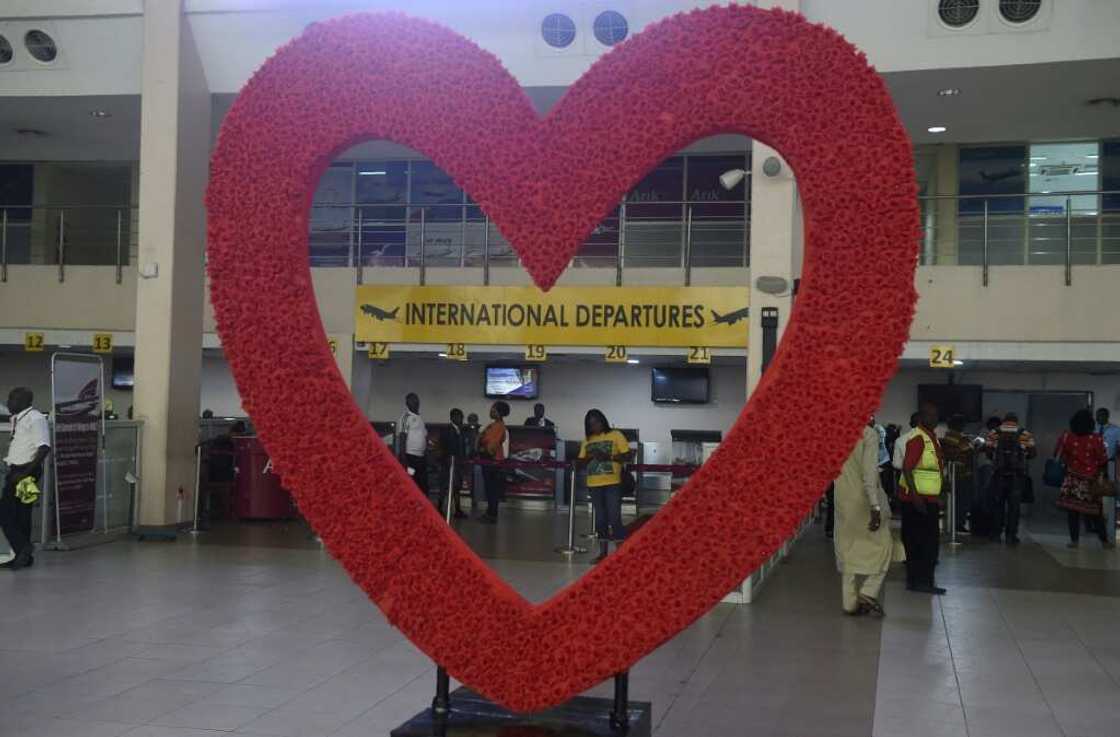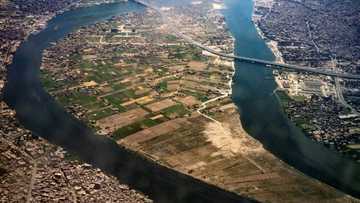'Japa': Emigration beguiles middle classes in troubled Nigeria

Source: AFP
PAY ATTENTION: Click “See First” under the “Following” tab to see Legit.ng News on your Facebook News Feed!
Ayo Aroloye was holding his newborn son when a power cut plunged the delivery room of the Lagos hospital into darkness.
The 34-year-old had to turn on his phone's torch so that the doctor who was about to stitch up his wife could see what he was doing.
Even though he earned an above-average salary as a banker, Aroloye saw the traumatic event as a sign that his country was broken.
"The Nigerian dream died in me," he said.
Like many other Nigerians, Aroloye decided it was time to "japa" -- a word in the Yoruba language that means "to flee."
After a two-year wait to get visas, he moved with his family to Canada, where he has now been living for four months.
PAY ATTENTION: Subscribe to Digital Talk newsletter to receive must-know business stories and succeed BIG!
Nigerians, rich and poor, have migrated to greener pastures for decades.
Today, though, anecdotal evidence suggests that among the middle classes, the outflow has become a flood, fuelled by a slumping currency, worsening insecurity, spiralling inflation and corruption.
Accurate figures for net emigration are hard to come by, and a government agency, the Nigerians in Diaspora Commission, cautions that while people do leave, some "constantly" return.
But these days, asking an educated Nigerian "what are your japa plans?" is as common as asking about their work or health, according to eight people from different backgrounds who spoke with AFP.
Not everyone can afford to emigrate, especially to countries that middle- and upper-class Nigerians aim for, like Canada, the US, the UK or other European countries.
Visas for those countries can be expensive and the authorities often require proof of funds for daily expenses, even after the visa has been paid.
But armed with patience -– it can take years to secure the paperwork -– and often with financial support from relatives, increasing numbers are heading abroad for work or study.
'Privileged poor'
"Nigerians’ assessment of their personal living conditions and the country’s economic situation have worsened dramatically over the past two years," the pan-African survey group Afrobarometer survey wrote in August.
With almost 20 percent inflation in July, many Nigerians can no longer buy items they were once able to afford.
Chuka Okeke is a Lagos-based project manager with a degree in computer science who earns around 650,000 naira (about $1,500) a month.
"Three years ago, I would call myself middle class but now I’m just a privileged poor person," he said, half-jokingly.
"I’m considering japaing via the study route," said the 33-year-old father of one. "It’s a whole mess and I didn't create the mess, so I don’t think I owe the country any loyalty to stay and fix it."
For Stella Ohemu, a 30-year-old pharmacist living in the capital Abuja and who earns around 110,000 naira (about 260 dollars) a month, life is "a merry-go-round."
"I’ve been working for three years. I had two jobs at one point, but it still wasn’t enough," she said, abandoning at least for now her dream of opening her own pharmacy.
She is applying for visas to work in Europe or in the US, where she is "sadly open to doing anything."
Even among those who earn much more, japa is enticing.
Augustine Ugi, a 36-year-old CEO of a software development company based in Lagos, earns "between five and ten million" naira (about 11,000 to 23,000 dollars) a month and employs more than 50 people.
"I am leaving because I have to sustain what I have built," said the recent father of twins who is moving to London but will continue travelling back to Nigeria to maintain his operations.
Frustration
On top of a sickly economy and ramshackle infrastructure, Nigeria's rampant insecurity and corruption are also cited by some as reasons why they up sticks.
"A lot of people who are rich in Nigeria tend to be (involved) in things that are illegal... and you’re here trying to follow the law, to be a good citizen, so you get frustrated," said Emmanuel Jimawo who arrived in Canada last week on a skilled worker visa.
The 32-year-old, who earned around 180,000 naira (about 420 dollars) a month as a business analyst at a utility company in Benin City, said he already had five interviews since moving, boosting his hopes of a brighter future.
A civil servant in Abuja who asked to be identified only by his first name Victor also cited graft as a factor for leaving.
"They (politicians) are keeping what they have for themselves and it affects everything else," said the 34-year-old who earns about the same as Ohemu and is applying for a visa for Canada.
Many young people drew up plans to emigrate after a bloody crackdown in 2020 on protests for better governance.
"We had come out to say 'no more' and what we got was indiscriminate killings," said Victor. "That was when some people realised 'there are no options here, I’m done'."
For Aroleye, moving to Canada with his wife and child was "like being born into a new world," before adding it was still "very painful" to leave.
"Nigeria is where I was born, it’s who I am. But I had to run."
Source: AFP






